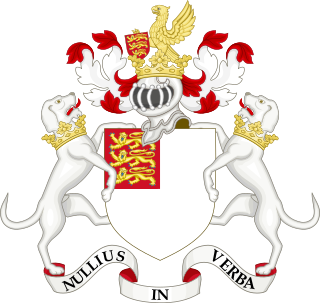Related Research Articles

The Royal Society for the Encouragement of Arts, Manufactures and Commerce (RSA), also known as the Royal Society of Arts or more commonly by its acronym RSA, is a London-based organisation committed to finding practical solutions to social challenges.
A fellow is a concept whose exact meaning depends on context. In learned or professional societies, it refers to a privileged member who is specially elected in recognition of their work and achievements. Within the context of higher educational institutions, a fellow can be a member of a highly ranked group of teachers at a particular college or university or a member of the governing body in some universities ; it can also be a specially selected postgraduate student who has been appointed to a post granting a stipend, research facilities and other privileges for a fixed period in order to undertake some advanced study or research, often in return for teaching services. In the context of research and development-intensive large companies or corporations, the title "fellow" is sometimes given to a small number of senior scientists and engineers. In the context of medical education in North America, a fellow is a physician who is undergoing a supervised, sub-specialty medical training (fellowship) after having completed a specialty training program (residency).

The Royal Society of Canada, also known as the Academies of Arts, Humanities and Sciences of Canada, is the senior national, bilingual council of distinguished Canadian scholars, humanists, scientists and artists. The primary objective of the RSC is to promote learning and research in the arts, the humanities and the sciences. The RSC is Canada's National Academy and exists to promote Canadian research and scholarly accomplishment in both official languages, to recognize academic and artistic excellence, and to advise governments, non-governmental organizations and Canadians on matters of public interest.

The Royal Society, formally The Royal Society of London for Improving Natural Knowledge, is a learned society and the United Kingdom's national academy of sciences. The society fulfils a number of roles: promoting science and its benefits, recognising excellence in science, supporting outstanding science, providing scientific advice for policy, education and public engagement and fostering international and global co-operation. Founded on 28 November 1660, it was granted a royal charter by King Charles II as The Royal Society and is the oldest continuously existing scientific academy in the world.

Fellowship of the Royal Society is an award granted by the judges of the Royal Society of London to individuals who have made a "substantial contribution to the improvement of natural knowledge, including mathematics, engineering science, and medical science".

The Royal Society of Literature (RSL) is a learned society founded in 1820, by King George IV, to "reward literary merit and excite literary talent". A charity that represents the voice of literature in the UK, the RSL has about 600 Fellows, elected from among the best writers in any genre currently at work. Additionally, Honorary Fellows are chosen from those who have made a significant contribution to the advancement of literature, including publishers, agents, librarians, booksellers or producers. The society is a cultural tenant at London's Somerset House.
Fellowship of the Royal Society of Canada (FRSC) is an award granted to individuals that the Royal Society of Canada judges to have "made remarkable contributions in the arts, the humanities and the sciences, as well as in Canadian public life". As of 2020, there are more than 2,000 living Canadian fellows, including scholars, artists, and scientists such as Margaret Atwood, Philip J. Currie, David Suzuki, Stephen Waddams, and Demetri Terzopoulos. There are four types of fellowship:
- Honorary fellows
- Regularly elected fellows
- Specially elected fellows
- Foreign fellows

The Royal Historical Society, founded in 1868, is a learned society of the United Kingdom which advances scholarly studies of history.

Fellowship of the Royal Society of Edinburgh (FRSE) is an award granted to individuals that the Royal Society of Edinburgh, Scotland's national academy of science and letters, judged to be "eminently distinguished in their subject". This society received a royal charter in 1783, allowing for its expansion.

The Biographical Memoirs of Fellows of the Royal Society is an academic journal on the history of science published annually by the Royal Society. It publishes obituaries of Fellows of the Royal Society. It was established in 1932 as Obituary Notices of Fellows of the Royal Society and obtained its current title in 1955, with volume numbering restarting at 1. Prior to 1932, obituaries were published in the Proceedings of the Royal Society.
References
- ↑ "Current Fellows". Royalsociety.org. Retrieved 2022-09-01.
- ↑ "Fellow Detail Page | Royal Society".